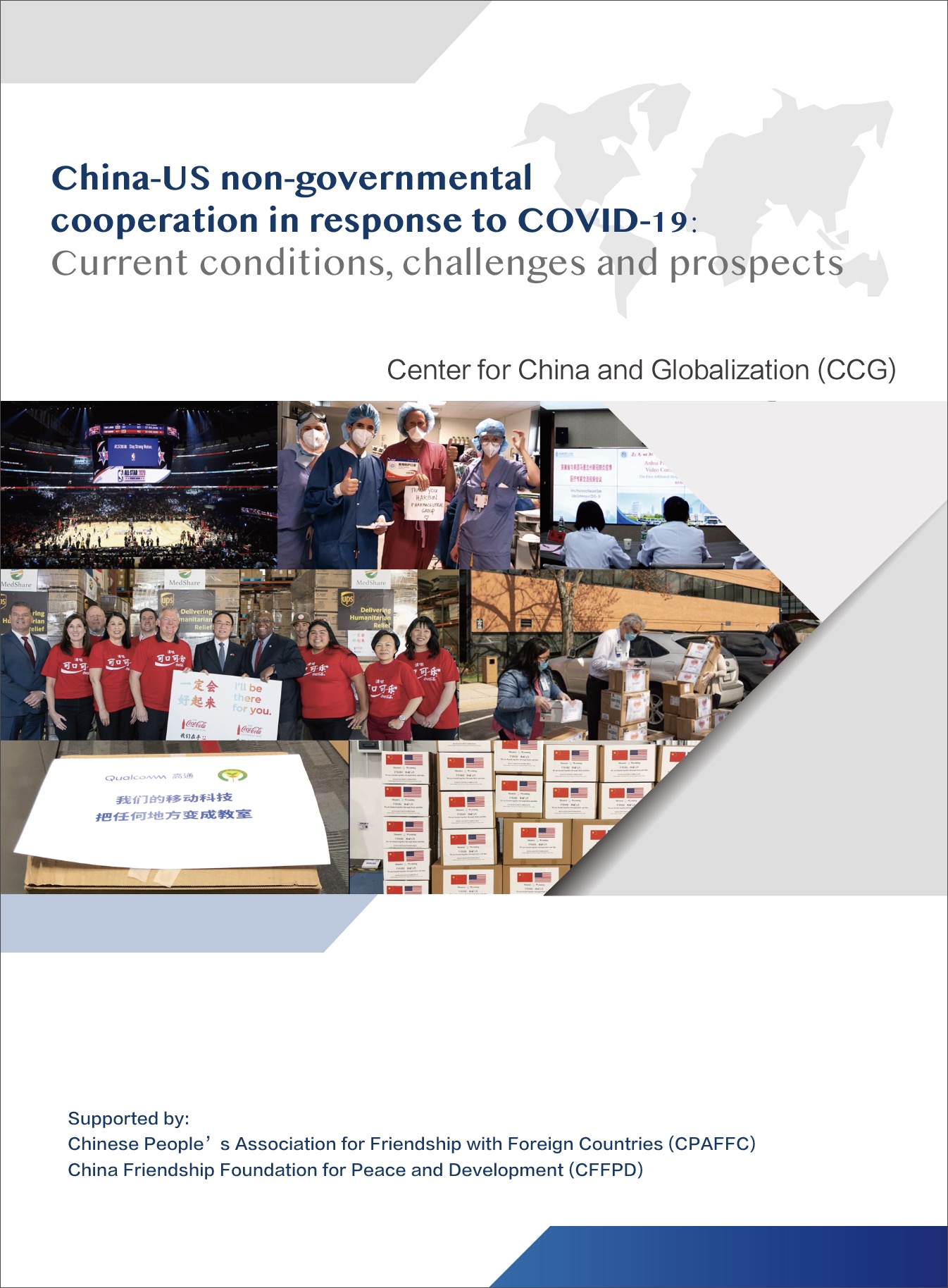China-US non-governmental cooperation in response to COVID-19: Current conditions, challenges and prospects

PDF Download
This report draws on continuous study of China-US non-governmental cooperation in response to COVID-19. It summarizes the facts of China-U.S. non-governmental anti-pandemic cooperation, analyzes the willingness, challenges, and reasons for China-US non-governmental anti-epidemic cooperation, and puts forward practical suggestions to boost this form of cooperation during and after the pandemic. The report hopes to encourage and provide guidance for further non-governmental exchange and cooperation between China and the United States.
Report findings: Key channels and main characteristics of China-US non-governmental cooperation
The report summarizes key channels of China-US non-governmental cooperation, including sister province-state and sister city pairings, Chinese and US medical staff and researchers, overseas Chinese and Chinese students in the US, the Chinese and American business communities, Chinese and American think tanks and scholars, Chinese and American NGOs and charitable foundations as well as the Chinese and American public.
The report shows five characteristics of China-US non-governmental cooperation.
1.Multi-actor cooperation
2.A broad, multilayer relationship
3.Flexible, efficient and targeted assistance drawing on diverse resources
4.A human and down-to-earth approach
5.Injecting positive energy into governmental relations
The reports shows that, by May 26, according to incomplete statistics from the Chinese People’s Association for Friendship with Foreign Countries, donations received by China (excluding Hubei) from sister states and related organizations in the US reached around CNY 666,000. Other donations included 171,088 masks of various kinds, 1,300 items of protective clothing, 893 pairs of goggles, 1,360 face masks, and other equipment to a valuation of CNY 200,000. Chinese provinces and cities made large donations to US sister cities, including 2.11 million masks, 35,937 items of protective clothing, 136 thousand pairs of medical gloves, 30220 goggles, 20,000 shoe covers, and 200 face masks.
Chinese and American chambers of commerce have also played an important role in the combat against COVID-19 by purchasing and donating materials, encouraging enterprises to make donations, and conducting research and evaluation on the impact of the pandemic. After the outbreak of the COVID-19 in China, AmCham member companies donated more than USD 74 million in cash, PPE, and other medical supplies to Wuhan and other affected areas, according to Terry Branstad, US ambassador to China.
Report analysis: willingness, challenges, and prospects to non-governmental cooperation against the pandemic
The report analyses willingness to cooperate amidst COVID-19 between China and the US non-governmental actors. It argues that beyond cultural differences lie shared concepts of humanity. These bonds help forge close relationships between the US and China and enhance mutual understanding.
The report also summarizes the drivers and challenges for China-US non-governmental cooperation.
1. Global governance found lacking as China-US cooperation stands at a crossroads
2. Ups and downs in China-US relations affect non-governmental exchange
3. Pathways for local cooperation have been constrained
4. Damage to global value chains and challenges for China-US economic cooperation
Based on these findings, the report makes proposals in three areas to strengthen China-US non-governmental cooperation amidst COVID-19.
1. Jointly strengthen anti-pandemic cooperation, including:
i. Stop the spread of the “political virus” and focus on anti-pandemic cooperation
ii. Strengthen cooperation in vaccine research between pharmaceutical companies and research institutions in China and the US
iii. Strengthen China-US sister-city network cooperation and establish one-to-to mutual assistance mechanisms
iv. Cooperation to establish anti-epidemic funds and provide more joint help to developing countries
2. Strengthen economic cooperation and revitalize global economic development, including:
i. Enhance China-US local economic cooperation via the sister-city network
ii. Deepen cooperation in the digital economy and create new growth points for economic recovery
iii. Strengthen economic cooperation and protect global value chains
3. Broaden non-governmental exchange in multiple fields and deepen mutual understanding between people of China and the US, including:
i. Establish a “Track II diplomacy” mechanism for Chinese and US think tanks and increase opportunities for dialogue between the two countries
ii. Increase exchanges in various fields such as tourism, education and humanities to deepen mutual understanding and trust
iii. Enhance communication and increase willingness to cooperate
This report is a new piece of global anti-COVI-19 research conducted by CCG, supported by the Chinese People’s Association for Friendship with Foreign Countries (CPAFFC) and China Friendship Foundation for Peace and Development (CFFPD). It is also the first report in the world to conduct in-depth investigation and research on the current situation and challenges of China-US non-governmental cooperation amidst the pandemic. The report aims to promote non-governmental sectors in China and the US to play a greater role in anti-pandemic efforts, and contribute insights to strengthen non-governmental cooperation between China and the US to accelerate epidemic control, world economic recovery, global governance innovation, and jointly promote the sustainable development of human society.






